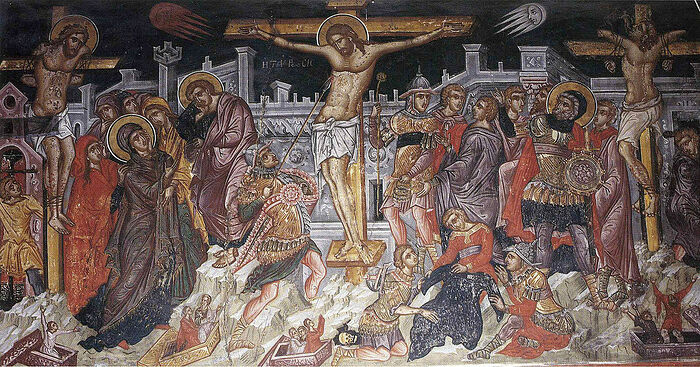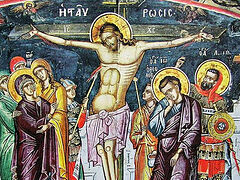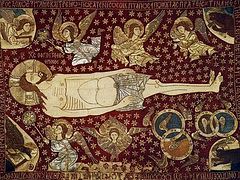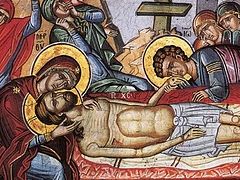My God, my God, why hast Thou forsaken me?
(Matthew 27:46)
Thus cried out the Lamb of God, the Lord Jesus, who was nailed to the cross for the sins of the world, and therefore for you and me, brothers and sisters. My God, My God! Why have You abandoned Me? He cried out according to His human nature, which has infirmities, not sins. But how could God the Father, who sent Him into the world to save the world, forsake His only begotten, His beloved Son? Divinity was inalienable and will forever remain inalienable from the human nature of Jesus Christ. This abandonment means, beloved brethren, that human nature in Jesus Christ was left to all the torment, to all the horror of the sufferings of the cross, to all the terrible, deadly sorrow that He experienced back in the garden of Gethsemane before His capture by a gang of villains led by Judas Iscariot.
He then began to be horrified, to grieve, and He said to the disciples: My soul is exceedingly sorrowful . . . tarry ye here and watch with me (Mt. 26:38).
Imagine, then, what were the torments of the body, what was the sorrow of the all-righteous and all-loving sensitive soul of the God-Man, who underwent execution for all human sins, for the sins of Adam and Eve and all their descendants without exception, and therefore for yours and mine! And you and I, brethren, are great sinners and are deserving of countless punishments for our innumerable iniquities. Judge, I say, judge, what was the sharpness, bitterness and burning of the sufferings of the cross, what was the spiritual sorrow of the Lamb of God, who took upon Himself the sins of the world; how hard it was for God to abandon Him, that is, to give His humanity all the burning suffering, to give His soul overwhelming, boundless, terrible sorrow. After that, you will understand in what state the soul of the God-Man was as He hung upon the cross, when He cried out: My God, why did You leave Me? Yes, the soul was together with His most pure body in a state of terrible, inconceivable and unimaginable suffering.
Know from here, O man, whoever you are, the bitterness, absurdity, ugliness, abomination, madness, hideousness, torment, and lethality of sin; know how it is unnatural to us, uncharacteristic of our divine nature, which was created in the image of God; and how the all-holy, all-perfect, all-good Deity abhors it. And after that, judge, everyone, how we should deal with sin, which seduces us and defiles and perverts our nature—corrupting her, plunging her into eternal dishonor, into eternal sorrow, into eternal torment, if we do not hate it—that is, sin—with all our soul; if we do not repent of iniquities, if we do not completely turn away from sin.
Imagine, imagine what would have happened to us if the only begotten Son of God had not suffered for our sins and had not satisfied the righteousness of God, and if God had withdrawn His grace from us forever? Oh, the mere imagination, the slightest idea of that chills the blood and terrifies the soul. Oh, if only I and all sinners would always remember this abandonment by God of unrepentant sinners, especially when sin tempts us. Then everyone would flee from sin more than from a snake or a bloodthirsty beast, more than from a cruel enemy! Oh, then there would be many more who would be saved. Then the earth would not be afflicted with terrible disasters for the sins of man: crop failures, floods, devastating earthquakes affecting thousands of human lives, widespread diseases, fruit damage, destructive fires. Then it would be the paradise of God, abounding in truth and all kinds of natural gifts of God. Then there would have been peace and security on earth; there would not have been these terrible atrocities, among which we have recently seen the most terrible of the terrible—the brazen and vicious murder of a peaceful and loving, meek tsar in broad daylight.1
Oh, how the world is now overflowing with lawless and iniquitous people! But how long will it still exist—this sinful world, this earth, the dwelling of sin, stained with the blood of guiltless and innocent victims, this accumulation of all kinds of abominations? Isn’t the time of the universal fiery purification already coming? Yes, it is of course already near at hand. If the apostles at one time spoke of its nearness, then we can speak all the more strongly about the nearness of the end of the age.
Brothers and sisters! As long as we still have time, let us approach the Savior of the world with fervent repentance and with love and tears kiss His wounds that He suffered for us. Let us love the truth, let us love mercy, so that we may have mercy. Amen.




